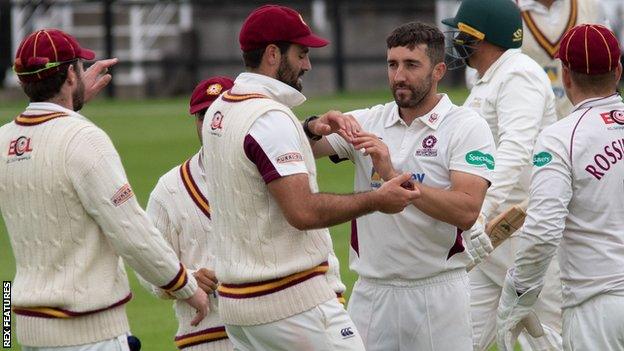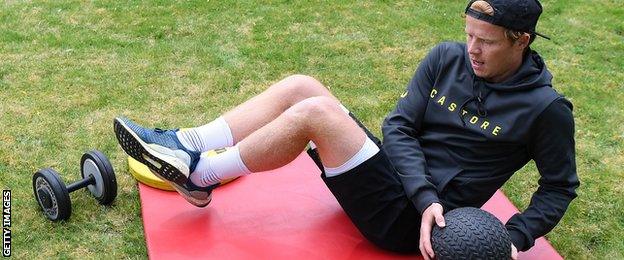Coronavirus: What county cricket has to do to potentially return this summer
- Published

The English domestic season was scheduled to start on 12 April
The 2020 county cricket season should now be entering its fourth week, but the coronavirus pandemic has meant we have yet to hear the thwack of leather on willow.
There will be no play until 1 July at the earliest, and The Hundred - the England and Wales Cricket Board's new competition - has already been put back until 2021.
If and when the season gets under way, it will be a very different experience for everyone concerned, with games seemingly certain to be played behind closed doors.
BBC Look East spoke to Northamptonshire's club doctor, Professor Bill Ribbans, about the challenges cricket faces if there is going to be any play this summer.
Training
"It'll almost certainly start off with just individuals coming to the ground and training alone," said Ribbans.
"Players will not be able to use showers and will have to come to training in their kit and get showered and changed when they return home.
"We'll then move towards very small groups and then finally when we get the go ahead it'll come back to full team training.
"It'll be very much a staged response. We hope, as that takes place, the national situation with respect to the pandemic will be improving all the time and the testing facilities will also improve to allow us to be as safe as possible for our players and all our staff."

Surrey and England batsman Ollie Pope shows how professional cricketers have been able to train from home
Testing
The England and Wales Cricket Board and the 18 first-class counties are currently trying to decide how often players will need to be tested to ensure they do not have Covid-19.
"I think the Premier League are talking about every five days may be safe, and we're looking at the Bundesliga in Germany," said Ribbans.
At the moment tests cost between £100 and £150 each, so a 30-man squad of players, coaches, physios and other staff could mean expenditure running into tens of thousands of pounds for each club - so there must be a guarantee games will be played.
"In professional sport, where you've got finances involved, right from the outset when people start training, you need to know there's going to be a product to generate revenue," explained the professor.
"We're not going to have a sport with spectators, it's going to be closed competition, so the only revenues are television.
"We need to know that the T20 Blast is going to happen, let's say at the end of August, and then you've got to work backwards."
Making facilities safe

Professor Bill Ribbans says cricket, like other sports, can never be 100% safe when it comes to coronavirus
Clubs will not be using any indoor facilities for practice but must maintain an intensive cleaning regimen around their grounds.
"It'll be all outdoor, and any areas that we do need we need to make sure they're de-cluttered as we know that the virus can sit on surfaces." said Ribbans, who is also a consultant in trauma and orthopaedic surgery and a professor of sports medicine.
"We need to have PPE available for staff treating any players who have any injuries - we're sourcing this locally and the ECB has also indicated that they would be giving us some help in that respect as well."
So once a club has got its bio-security measures in place, its players fit and all have tested negative for coronavirus, how do they go about staging matches?
"The toss will have to be done socially distanced," said Ribbans.
"There isn't any reason why the umpire can't go out and liaise with the captains behind the boundary ropes socially distanced from each other."
The pre-match toss-up was due to return in the County Championship this summer after not being mandatory for the past four seasons, with away sides given the option of bowling first without need for one.
Meanwhile, scorers from each club, who traditionally sit next to one another, would have to be kept apart, and the days of the ball being returned to the bowler via the hands of half the team are gone, for now at least.
"I imagine we'll be asking for the wicketkeeper to send it straight back to the bowler to minimise the number of hands that it goes through," he added.
Methods of shining the ball - key to a bowler getting it to swing - will also have to change.
"I'm absolutely sure that the players are going to be told that they cannot use saliva and they cannot use sweat," said Ribbans.
"I know there is a company looking at producing a wax that might be used, which would be equivalent to keep one side of the ball shiny, so that's one option."
Players' reservations
Every player's personal circumstances will be different - some may have vulnerable people in their household and will be reluctant to return to training, while others may have no such concerns.
"I feel that the adoption of the regulations that we will have will make the sport hopefully as safe as it can possibly be, and in many respects safer than many other activities that sports players may be doing during their normal day-to-day activities," said Ribbans.
"But we can never ever say it will be 100% safe."
He believes that no player should be forced to return to training and matches if they do not feel comfortable.
"In my personal view, if the player has a real genuine reason for not wanting to come back into playing until certain conditions have been met then I do think we have to honour that," he added.